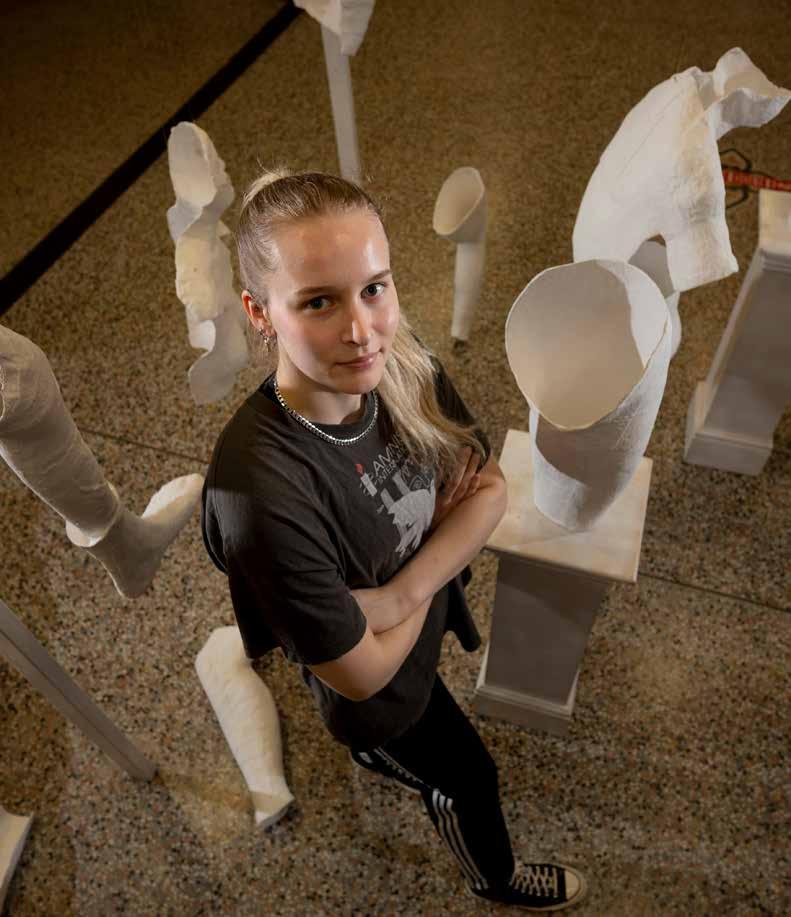
4 minute read
FUTURES
(1) LANDSCAPE LAYOUT
FUTURES –Aiming Higher…
The St Dunstan’s
DIPL OMA
This curriculum has a global outlook and helps students to develop the practical research and application skills they need to both step up their Academic profiles, as well as let them start to explore issues and ideas that might be of career and vocational interest. We see this as a marker of St Dunstan’s commitment to a renaissance education, aware as we are that the thinkers and artisans of the Quattrocento travelled widely, read deeply, became as skilled in hand as in mind.
Four orThree A Level subjects For the Diploma diagram, the titles for each section are A- A Levels C- Co-Curricular Activities E- Elective Courses so take out references to ECAS/ ACAS/Examined Curriculum and Skills sub-text etc
Prefects Sports Volunteering Socie es The Arts
Global Perspec ves Prac cal Qualifica ons Learn a Language Online Courses UCAS (2) TRIANGULAR LAYOUT
Co-curricular Activities
Leadership Sports Volunteering Societies The Arts
The Futures Curriculum has four components: ● Higher Education and Career
route-finding, all students
● Aiming High specialist
support groups for Oxbridge,
Medics, Dentist, Vets and
Lawyers
● Global Perspectives
Qualification, which can be opted out of by students after certain levels of attainment, or can be taken as a full A Level alongside subject A Levels
● Futures explorations courses
that students can opt into over the two years
Higher Education & Careers
Our employment in the future will not look like the employment of the past. Indeed, the jobs most young people will go on to do may well not have been invented as yet, and lifelong training and re-training are likely to be the norm. The Sixth Form has a dedicated Futures team to prepare and shape post-College pathways: ● Director of Futures: they guide the creation of university applications, information and institution finding, personal statement building, reference construction and organisation of UCAS grades as well as managing submissions to meet scheduled deadlines.
● All of Year 12 spend a week in
June working with employers and companies across London and the South East. Students will also be supported with writing
CVs, application forms and advice on interviews and assessment centres via the tutorial programme.
● The Director of Futures also shapes knowledge of the workplace, vocational applications, organises and oversees work placements - including the summer Workplace
Week in Trinity Term of Year 12 - and guides the students in building a bespoke Curriculum Vitae.
● Aiming High Group provides access to elite university study programmes: institutions such as LSE, Cambridge, Imperial College and Oxford, Sciences Po Grande Ecole in Paris, the South East Asian universities, as well as Canada and the American Ivy league. The group builds such interest through Year 10 and 11, and then meets weekly during Year 12 to properly prepare for such bespoke applications often required early in Year 13.
● } There is a different arm of the
Aiming High group with a specialist who mentors doctors, lawyers and veterinarians, and a similar one for Art School applications, all of which run on different tram lines to UCAS and therefore require different sorts of support and mentoring. Each year, the
College holds a very popular
Careers Fair which is attended by delegates from a diverse range of fields, reflecting the range of employment opportunities pursued by our students and allowing them to network and ask questions of those with the most up-to-date careers information.

THE GLOBAL PERSPECTIVES A LEVEL QUALIFICATION
Whilst this is formallyspeaking an ‘A Level’, it is skills-based, rather than subject-based, and allows students to take up and develop research interests outside of the traditional disciplines.
All students in Year 12 begin the qualification, then after a term’s work, they can decide whether to continue it for the rest of the year sitting an AS Level qualification, or exchange it in favour of other Futures-based courses. If continued to end of Year 12, those students can then decide to convert the qualification to a full A Level in Year 13, where the student writes a Research project on a subject of their choosing. In many institutions, A Level students are expected to take the Extended Project Qualification (EPQ), but we prefer the Global Perspectives research project because the issues chosen must be internationalist in outlook and compare different cultural perspectives. If a student completes the full course and maintains their four subject A Levels it is possible for them to leave with five A Levels.
FUTURES EXPLORATION COURSES
In order to build more diverse educational portfolios, we also offer the Sixth Form chances to develop practical and workplace skills that will better equip them for life after college. From Lent Term of Year 12, three periods a fortnight are available to enable such courses and all students get at least two full terms to also try out these courses during their Sixth Form experience. Most Futures Exploration courses are four to six weeks in length. Here are examples:
● Babbel or Rosetta Stone
Language on-line course ● FutureLearn, EDX, OpenLearn online courses ● First Aid & Youth Mental Health in-house training ● British Sign Language in-house training ● Medic / Dentist / Vet application in-house preparation ● Climbing instructions & lead climbing, in-house ● Barista training – external provider, weekends ● Learning to cook in-house training ● Learning to debate ● Learning to drive – theory test training ● IELTS certificate ● Learning to use Microsoft Office & Excel We use the bespoke Unifrog computer database training system to record, manage and collate progress across the whole of the Futures Curriculum. Tutors will train and help students manage this system to meet each individual pathway and in doing so create individual Curriculum Vitae.











